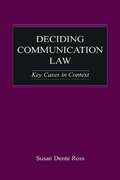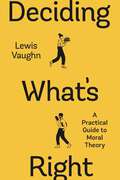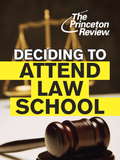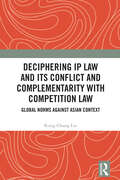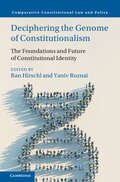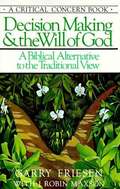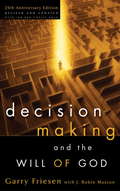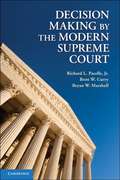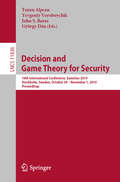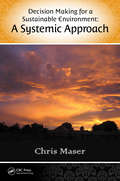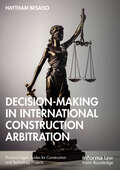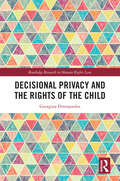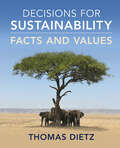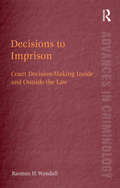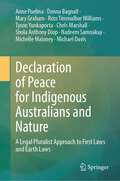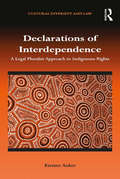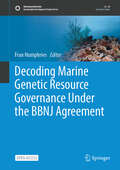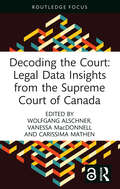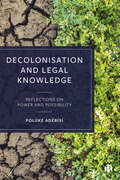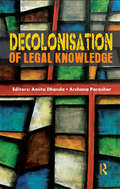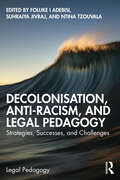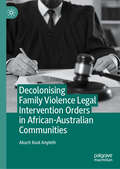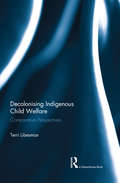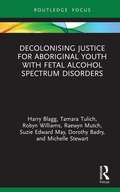- Table View
- List View
Deciding Communication Law: Key Cases in Context (Routledge Communication Series)
by Susan Dente RossThis clearly written and well-focused volume combines concise decisions of the primary areas of communication law with the foundational case decisions in those domains. Thus, in one volume, students of communication law, constitutional law, political science, and related fields find both the key rulings that define each area of law and a detailed summary of the legal concepts, doctrines, and policies so vital to understanding the rulings within their legal context. The text forgoes the tendency to provide encyclopedic treatment of all the relevant cases and focuses instead on the two or three cases most vital to an accurate and informed understanding of the current state of each field of communication law. The chapters provide readers with the most salient concepts and the necessary depth to understand the law while permitting most reading time to be directed to the law itself. Full-text rulings allow readers to immerse themselves in the law itself--to develop a feel for its complexity, its flexibility, and its language. Useful as a quick reference to the landmark rulings and the jurisprudence of communication law, this book also serves well as the primary text in related undergraduate courses or as a supplemental text in graduate classes in the field.
Deciding What's Right (First Edition): A Practical Guide To Moral Theory
by Lewis VaughnThe ethics primer for students in a hurry Deciding What’s Right by Lewis Vaughn empowers students with the knowledge and skills they need to navigate moral quandaries with confidence and integrity. The author doesn’t simply introduce moral theory; he brings it to life with evocative cases, rich pedagogy, and sustained emphasis on critical thinking. With remarkably effective chapters on moral reasoning—including a unique “Framework for Moral Decision-Making”—and deeper coverage of applied ethics than any text of its kind, Deciding What’s Right sets a new standard for introductory ethics courses.
Deciding to Attend Law School
by Princeton ReviewThinking of going to law school? This concise but comprehensive ebook gives you the information you need to decide if a JD and a career as a lawyer are right for you. In Deciding to Attend Law School, Eric Owens and the experts at the Princeton Review lay out key information to give you a thorough understanding of the issues you may need to consider before applying to law school. You'll get essential info on: · the current admissions landscape · the academic experience · paying for law school · what the market for legal jobs is like right now · factors to consider when choosing a law school · what you can expect after graduation Will you enjoy law school socially? Will you be happy practicing law? What kind of law career might be the most rewarding for you? Will you be able to pay off your loans? Deciding to Attend Law School will give you the information you need to answer those questions--the background, the statistics, and the context to help you make the most informed choice possible. As a bonus, we've also included 3 lists from our popular The Best 167 Law Schools profile guide, showing Admissions Selectivity, Academic Experience, and Career Prospects ratings for all 167 schools.
Deciphering IP Law and Its Conflict and Complementarity with Competition Law: Global Norms Against Asian Context
by Kung-Chung LiuThis book introduces a general theory of intellectual property (IP) law, highlighting its importance and relevance in addressing complex IP issues in the digital economy, which often intersect with competition law.The book argues for the need for a unified theory of IP to elevate it as a discipline in its own right, while recognizing the diversity and nuance of IP laws. It explores how such a theory can address the challenges posed by the knowledge economy, the platform economy, the data-driven economy, and generative AI. The book views IP as a market regulatory mechanism designed to remedy market failures in public goods by providing sufficient protection to incentivize human creation and its operation and sharing across societies. It also emphasizes the need for competition law when IP oversteps its legitimate boundaries and becomes the source of other market failures. The study critically examines the TRIPS Agreement and many established stereotypes of IP theories and regimes. It offers a global perspective with a special focus on Asian considerations.The title will be essential reading for scholars, students, practitioners, and policymakers interested in regulatory reform and the evolving landscape of intellectual property law and its interaction with competition law in the digital age.
Deciphering the Genome of Constitutionalism: The Foundations and Future of Constitutional Identity (Comparative Constitutional Law and Policy)
by Ran Hirschl Yaniv RoznaiDecision Making and the Will of God: A Biblical Alternative to the Traditional View
by Garry Friesen Robin MaxsonA bible-based alternative to the traditional view of how God's will works in our life.
Decision Making and the Will of God: A Biblical Alternative to the Traditional View (Critical Concern Ser.)
by Garry Friesen J. Robin MaxsonDoes God Have a Perfect Will for Your Life? Does God have a perfect will for each Christian? Can you be absolutely certain of God’s specific will foryourlife? In this expanded twenty-fifth anniversary edition of his highly acclaimed work, Garry Friesen examines the prevalent view on God’s will today and provides a sound biblical alternative to the traditional teaching of how God guides us. This new edition includes these helpful resources: • Study guide for small groups • Responses to Frequently Asked Questions • Guide to painless Scripture memorization Friesen tackles the very practical issues of choosing a mate, picking a career, and giving in this fresh and liberating approach to decision making and the will of God. Story Behind the Book Most Christians have been taught how to find God’s will, yet many are still unsure whether they’ve found it. God does guide His people, but the question is, “How does He guide?” After “putting out a fleece” to decide which college to attend, Garry Friesen began pondering why it was so hard to find God’s will when he had so sincerely sought it. Was he the only one who did not have 100 percent clarity for every decision? Then a new possibility struck-perhaps his understanding of the nature of God’s will was biblically deficient. Maybe there was a better way to understand HOW God guides.
Decision Making by the Modern Supreme Court
by Richard L. Pacelle Jr Bryan W. Marshall Brett W. CurryThere are three general models of Supreme Court decision making: the legal model, the attitudinal model and the strategic model. But each is somewhat incomplete. This book advances an integrated model of Supreme Court decision making that incorporates variables from each of the three models. In examining the modern Supreme Court, since Brown v. Board of Education, the book argues that decisions are a function of the sincere preferences of the justices, the nature of precedent, and the development of the particular issue, as well as separation of powers and the potential constraints posed by the president and Congress. To test this model, the authors examine all full, signed civil liberties and economic cases decisions in the 1953-2000 period. Decision Making by the Modern Supreme Court argues, and the results confirm, that judicial decision making is more nuanced than the attitudinal or legal models have argued in the past.
Decision and Game Theory for Security: 10th International Conference, GameSec 2019, Stockholm, Sweden, October 30 – November 1, 2019, Proceedings (Lecture Notes in Computer Science #11836)
by Tansu Alpcan Yevgeniy Vorobeychik John S. Baras György DánThis book constitutes the refereed proceedings of the 10th International Conference on Decision and Game Theory for Security, GameSec 2019,held in Stockholm, Sweden, in October 2019.The 21 full papers presented together with 11 short papers were carefully reviewed and selected from 47 submissions.The papers focus on protection of heterogeneous, large-scale and dynamic cyber-physical systems as well as managing security risks faced by critical infrastructures through rigorous and practically-relevant analytical methods.
Decision-Making for a Sustainable Environment: A Systemic Approach (Social Environmental Sustainability)
by Chris MaserIncreasingly, environmental decision making is like playing a multidimensional game of chess. With interactions between the atmosphere, the litho-hydrosphere, and the biosphere, the game is at once a measure of complexity, uncertainty, interdisciplinary acuity, social-environmental sustainability, and social justice for all generations. As such, it
Decision-making in International Construction Arbitration (Practical Legal Guides for Construction and Technology Projects)
by Haytham BesaisoThis book contributes to the empirical understanding of how arbitrators make their decisions on the substance of commercial disputes arising from international construction projects. It is based on in-depth interviews with 28 international construction arbitrators and on the analysis of dozens of international construction arbitration awards. The combined experience of those who participated in the author’s research amounted to hundreds of international construction arbitrations (~ 300 cases) in addition to several hundred international commercial arbitrations. It presents the results of the first and largest research to be undertaken in this area, and it will be useful to arbitration practitioners and scholars and to the wider audience of dispute resolution students, practitioners, and theorists. In turn, the book examines to what extent international arbitrators apply the law as the substantive norm, providing an explanation for that, and then offers insights into whether arbitrators, in fact, lean towards commercial and transnational norms to construe the parties’ contract before discussing to what extent international arbitrators take into account fairness considerations to reach their decisions on the merits of the parties’ claims. The book also examines to what extent international arbitrators apply mandatory rules of foreign law. Lastly, it provides insight into the effect of arbitrators’ background characteristics on their decisions. Written for arbitration practitioners (arbitrators and legal counsel) and scholars, the book will be useful for both experienced arbitrators and those starting their arbitration career or studying for their arbitration qualification. It will also be useful for project professionals involved in contract management and dispute resolution.
Decisional Privacy and the Rights of the Child (Routledge Research in Human Rights Law)
by Georgina DimopoulosDecisional privacy gives individuals the freedom to act and make decisions about how they live their lives, without unjustifiable interference from other individuals or the state. This book advances a theory of a child’s right to decisional privacy. It draws on the framework of the United Nations Convention on the Rights of the Child and extends the work of respected children’s rights scholars to address a significant gap in understanding the interconnections between privacy, family law and children’s rights. It contextualises the theory through a case study: judicial proceedings concerning medical treatment for children experiencing gender dysphoria. This work argues that recognising a substantive right to decisional privacy for children requires procedural rights that facilitate children’s meaningful participation in decision-making about their best interests. It also argues that, as courts have increasingly encroached upon decision-making regarding children’s medical treatment, they have denied the decisional privacy rights of transgender and gender diverse children. This book will benefit researchers, students, judicial officers and practitioners in various jurisdictions worldwide grappling with the tensions between children’s rights, parental responsibilities and state duties in relation to children’s best interests, and with the challenge of better enabling and listening to children’s voices in decision-making processes.
Decisions for Sustainability: Facts and Values
by Thomas DietzDecisions by individuals, organisations, and nations shape the well-being of humans and other species, the environment, and sustainability. Decisions for Sustainability examines how we can make better decisions concerning our future. It incorporates sociological, psychological, and economic perspectives to highlight our strengths and weaknesses in decision-making, and suggest strategies to influence both individual and societal decisions. Sustainability challenges – from local land use and toxic contamination to climate change and biodiversity loss – illustrate how we can improve decision making and what factors lead to conflict. How we use science in the face of uncertainty is also examined, and a range of ethical criteria for good decisions are proposed. Emphasizing the need for diversity in decision making and clarifying the relationship between reform and societal transformation, this book provides a comprehensive view of what we know about decision-making, and how we can do better in the face of sustainability challenges.
Decisions to Imprison: Court Decision-Making Inside and Outside the Law (New Advances in Crime and Social Harm)
by Rasmus H. WandallRasmus Wandall uses quantitative and qualitative methods from studies carried out in Denmark, to address the formal and informal norms and ideologies that are used to generate decisions to imprison. Focusing on the operations of the courtroom participants, his work investigates how court decision-making is organized to allow the sentencing procedure to be open to more than its formal legal framework, while at the same time keeping the sentencing within the boundaries of law and legal validity. The author uses the theory of law's operational closure, developed by Niklas Luhmann. The theory provides an advantageous point of departure to capture the close and subtle interactions between law's need for validity and for contextual openness in every legal operation - including court decision-making.
Declaration of Peace for Indigenous Australians and Nature: A Legal Pluralist Approach to First Laws and Earth Laws
by Michael Davis Mary Graham Michelle Maloney Tyson Yunkaporta Anne Poelina Donna Bagnall Ross Timmulbar Williams Chels Marshall Shola Anthony Diop Nadeem SamnakayThis groundbreaking book delves into the lived experiences and collective wisdom of Indigenous communities impacted by colonialism. Through collaborations with non-Indigenous colleagues, this book seeks to inform current legal practices and advocate for a transformative shift toward justice, equity, and the recognition of First Law and Earth-centered law.By presenting Indigenous stories as case studies and incorporating the collective wisdom gained through extensive discussions and exchanges with non-Indigenous colleagues, the authors highlight the ways in which Australian law falls short in upholding holistic principles and fails to align with First Law and Earth-centered law. The book invites readers to consider alternative legal futures that are rooted in respect, justice, and the well-being of both Indigenous peoples and the natural environment. Through its thought-provoking analysis, literature reviews, and insights from Indigenous leaders, this book servesas a powerful resource for legal practitioners, policymakers, scholars, and anyone passionate about social justice and environmental sustainability. The book aims to ignite meaningful dialogue and inspire concrete actions to address the historical injustices faced by Indigenous peoples while fostering a more inclusive and equitable legal framework for the generations to come.
Declarations of Interdependence: A Legal Pluralist Approach to Indigenous Rights (Cultural Diversity and Law)
by Kirsten AnkerThis book takes up the postcolonial challenge for law and explains how the problems of legal recognition for Indigenous peoples are tied to an orthodox theory of law. Constructing a theory of legal pluralism that is both critical of law's epistemological and ontological presuppositions, as well as discursive in engaging a dialogue between legal traditions, Anker focusses on prominent aspects of legal discourse and process such as sovereignty, proof, cultural translation and negotiation. With case studies and examples principally drawn from Australia and Canada, the book seeks to set state law in front of its own reflection in the mirror of Indigenous rights, drawing on a broad base of scholarship in addition to legal theory, from philosophy, literary studies, anthropology, social theory, Indigenous studies and art. As a contribution to legal theory, the study advances legal pluralist approaches not just by imagining a way to ’make space for’ Indigenous legal traditions, but by actually working with their insights in building theory. The book will be of value to students and researchers interested in Indigenous rights as well as those working in the areas of socio-legal studies, legal pluralism and law and cultural diversity.
Decoding Chinese Bilateral Investment Treaties
by Shen WeiThis is a major work investigating China's bilateral investment treaties (BITs) regime through various approaches including textual analysis, case study, comparative study and empirical study. This book tries to unveil some of the puzzles in Chinese BITs. The general consensus is that the evolution of China's BIT regime has its underlying logic, which follows an investment liberalization trend and fits China's changing role from a key capital-importing state to a major capital-exporting state. A similar trend is evident in Chinese BIT-making and BIT policy. This book investigates these theoretical assumptions and looks into some of the loopholes in Chinese BITs.
Decoding Marine Genetic Resource Governance Under the BBNJ Agreement (Sustainable Development Goals Series)
by Fran HumphriesThis open access book provides practical guidance for understanding the new treaty adopted in June 2023 that will change the way biodiversity is governed in about two thirds of the oceans known as areas beyond national jurisdiction (ABNJ). The Agreement under the United Nations Convention on the Law of the Sea on the Conservation and Sustainable Use of Marine Biological Diversity of Areas Beyond National Jurisdiction is an achievement for global cooperation in conservation, sustainability and equity. The treaty provisions in Part II on Marine Genetic Resource (MGR) governance were the most contentious element of negotiations, resulting in significant innovation and compromise. It has an ambitious framework with many details yet to be fleshed out after the treaty comes into force. There is no comprehensive guidance for stakeholders about what the treaty means for their current and future research and development (R&D) and commercialisation of MGR of ABNJ, digital sequence information and associated traditional knowledge. Through a detailed commentary and real world examples, this book interprets and analyses the treaty text to offer practical considerations, guidelines and tools to assist policy makers as well as scientists and commercial end users to align their R&D practices with the expected implementation of the treaty.
Decoding the Court: Legal Data Insights from the Supreme Court of Canada
by Wolfgang Alschner, Vanessa MacDonnell and Carissima MathenThis edited collection combines state-of-the-art legal data analytics with in-depth doctrinal analysis to study the Supreme Court of Canada (SCC), Canada’s top court. A data analytics perspective adds new dimensions to the study of courts and their case law. It renders legal analysis scalable, making it possible to investigate thousands of judicial decisions, adding new breadth and depth. It also enables researchers to combine doctrinal questions about how the law evolves with institutional questions about how courts operate, shedding new light on how law works in practice. By applying a range of methods to study the content of SCC decisions, this work bridges the gap between qualitative and quantitative research. Demonstrating how new analytical perspectives can generate new insights about the Supreme Court, an institution which is closely studied by scholars both within and outside Canada, the book will be essential reading for legal scholars and political scientists, particularly those working in public law and in empirical legal studies.
Decolonisation and Legal Knowledge: Reflections on Power and Possibility
by Folúkẹ́ AdébísíThe law is heavily implicated in creating, maintaining, and reproducing racialised hierarchies which bring about and preserve acute global disparities and injustices. This essential book provides an examination of the meanings of decolonisation and explores how this examination can inform teaching, researching, and practising of law. It explores the ways in which the foundations of law are entangled in colonial thought and in its [re]production of ideas of commodification of bodies and space-time. Thus, it is an exploration of the ways in which we can use theories and praxes of decolonisation to produce legal knowledge for flourishing futures.
Decolonisation of Legal Knowledge
by Archana Parashar Amp Amita DhandaThe premise of this book is that legal theory in general, and critical legal theory in particular, do not facilitate the identification of choices being made in the different facets of law -- whether in the enacting, interpreting, administering or theorising of law.
Decolonisation, Anti-Racism, and Legal Pedagogy: Strategies, Successes, and Challenges (Legal Pedagogy)
by Ntina Tzouvala Suhraiya Jivraj Foluke I AdebisiThis book offers an international breadth of historical and theoretical insights into recent efforts to "decolonise" legal education across the world. With a specific focus on post- and decolonial thought and anti-racist methods in pedagogy, this edited collection provides an accessible illustration of pedagogical innovation in teaching and learning law. Chapters cover civil and common law legal systems, incorporate cases from non-state Indigenous legal systems, and critically examine key topics such as decolonisation and anti-racism in criminology, colonialism and the British Empire, and court process and Indigenous justice. The book demonstrates how teaching can be modified and adapted to address long-standing injustice in the curriculum. Offering a systematic collection of theoretical and practical examples of anti-racist and decolonial legal pedagogy, this volume will appeal to curriculum designers and law educators as well as to undergraduate and post-graduate law level teachers and researchers.
Decolonising Family Violence Legal Intervention Orders in African-Australian Communities
by Akuch Kuol AnyiethThis book presents an intersectional, decolonial analysis of family violence intervention/prevention within the African-Australians Communities in Victoria, Australia. It explores the experiences of Family Violence Intervention Orders (FVIOs), assessing their effectiveness as interventions and safeguards against family violence in the African-Australian Communities. It investigates the influence of African-Australians cultural practices on the understanding and application of FVIOs, as well as participants' proposed strategies for enhancing or aligning these legal interventions with existing African practices for preventing and managing family violence. The application of this intersectional approach plays a pivotal role in illuminating complexities of social history, culture, and identity that intersect with, and extend beyond, gender. This includes experiences of social conflict, migration, exclusion, and hardship. These factors complicated their experiences of family violence and added layers of intricacy when navigating the Australian legal system to seek legal protection through family violence intervention orders. The book documents these complexities in intersecting experiences of family violence, the cultural specificities of the Australian legal system's interventions in family matters, intervention orders, and the involvement of various services. It shows how the implementation of the FVIOs with little consideration for social and cultural context diminishes their effectiveness as tools to combat family violence and enhance safety within the African-Australian communities. This book speaks to family violence scholars and practitioners and to those interested in multicultural and migration studies and intersectional and decolonial methods more broadly.
Decolonising Indigenous Child Welfare: Comparative Perspectives
by Terri LibesmanDuring the past decade, a remarkable transference of responsibility to Indigenous children’s organisation has taken place in many parts of Australia, Canada, the USA and New Zealand. It has been influenced by Indigenous peoples’ human rights advocacy at national and international levels, by claims to self-determination and by the globalisation of Indigenous children’s organisations. Thus far, this reform has taken place with little attention from academic and non-Indigenous communities; now, Decolonising Indigenous Child Welfare: Comparative Perspectives considers these developments and, evaluating law reform with respect to Indigenous child welfare, asks whether the pluralisation of responses to their welfare and well-being, within a cross-cultural post-colonial context, can improve the lives of Indigenous children. The legislative frameworks for the delivery of child welfare services to Indigenous children are assessed in terms of the degree of self-determination which they afford Indigenous communities. The book draws upon interdisciplinary research and the author’s experience collaborating with the peak Australian Indigenous children’s organisation for over a decade to provide a thorough examination of this international issue. Dr Terri Libesman is a Senior Lecturer in the Law Faculty, at the University of Technology Sydney. She has collaborated, researched and published for over a decade with the peak Australian Indigenous children’s organisation.
Decolonising Justice for Aboriginal youth with Fetal Alcohol Spectrum Disorders (Criminology in Focus)
by Michelle Stewart Robyn Williams Tamara Tulich Harry Blagg Raewyn Mutch Suzie Edward May Dorothy BadryThis book reflects multidisciplinary and cross-jurisdictional analysis of issues surrounding Fetal Alcohol Spectrum Disorders (FASD) and the criminal justice system, and the impact on Aboriginal children, young people, and their families.This book provides the first comprehensive and multidisciplinary account of FASD and its implications for the criminal justice system – from prevalence and diagnosis to sentencing and culturally secure training for custodial officers. Situated within a ‘decolonising’ approach, the authors explore the potential for increased diversion into Aboriginal community-managed, on-country programmes, enabled through innovation at the point of first contact with the police, and non-adversarial, needs-focussed courts. Bringing together advanced thinking in criminology, Aboriginal justice issues, law, paediatrics, social work, and Indigenous mental health and well-being, the book is grounded in research undertaken in Australia, Canada, and New Zealand. The authors argue for the radical recalibration of both theory and practice around diversion, intervention, and the role of courts to significantly lower rates of incarceration; that Aboriginal communities and families are best placed to construct the social and cultural scaffolding around vulnerable youth that could prevent damaging contact with the mainstream justice system; and that early diagnosis and assessment of FASD may make a crucial difference to the life chances of Aboriginal youth and their families.Exploring how, far from providing solutions to FASD, the mainstream criminal justice system increases the likelihood of adverse outcomes for children with FASD and their families, this innovative book will be of great value to researchers and students worldwide interested in criminal and social justice, criminology, youth justice, social work, and education.
